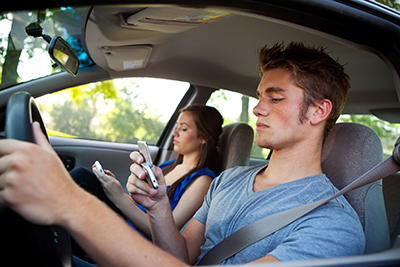Study: Teen Crashes Cause Nearly 20 Percent More Deaths On Summer Days

A recent study shows teen drivers are more likely to cause crashes resulting in injury or death during the summer months.
When your teen driver picks up the keys, you may casually say, “Have fun and be safe.” But this is when your worry sets in.
In this blog, Breakstone, White & Gluck reports on the latest research on teen drivers along with essential safety fundamentals to share with your family. Our partners each have more than 35 years of experience representing those who have been injured by negligent drivers in Boston, Cambridge and across Massachusetts. To avoid these tragedies, we encourage parents to play an even more proactive role to encourage safety during the summer months.
AAA Foundation for Traffic Safety “100 Deadliest Days” Study
A new study reports two-thirds of people injured or killed in car crashes involve a teen driver. The AAA Foundation for Traffic Safety released this figure as part of its “100 Deadliest Days” report on the period from Memorial Day to Labor Day. During the past five years, nearly 3,500 people have been killed in crashes caused by teens during the summer months, according to AAA.
More than a quarter of the teen driving crashes were caused by speeding. Teens who were drinking and driving caused 17 percent of the deadly collisions while distracted driving behaviors caused 9 percent of the deaths.
Other findings:
- Teen drivers, age 15-18, are 17 percent more likely to cause a fatal car crash in the summer than other times of the year.
- The legal age for consuming alcohol is 21 years old in every state. Yet 1 in 6 teens involved in fatal summer crashes tested positive for alcohol.
- More than 52 percent of teens participating in AAA’s research reported they had read a text message or email while driving in the past 30 days. Another 40 percent admitted to sending one.
- As part of its research, AAA used in-vehicle dash cameras and found 58 percent of teens who caused a crash were engaged in distracted behaviors. This was four times as high as federal estimates.
Other research goes deeper, showing teen drivers crash nearly 4 times as often per mile as drivers age 20 and up (Insurance Institute of Highway Safety.) The younger the driver, the more likely they are to crash due to inexperience or risky behaviors. Even a couple years can make a significant difference. For instance, the crash rate for 16-year-old drivers is 1.5 times as great as for 18- and 19-year-olds.
A few tips for your family:
Teen driving agreement. If you have never done so, now is a good time to have your child sign a teen driving agreement. Don’t just get a signature. Ask your teen to read each point out loud and ask if they understand or have any questions.
Massachusetts Junior Operator Law. Remind your teen that they have additional restrictions under the state’s junior operator law. If they violate the law, they may be cited and the infraction will go on their driving record. There is nothing you can do to help them at that point unless you plan to hire a criminal defense lawyer and attempt to challenge the citation.
For the first six months, drivers age 16 ½ to 18 cannot carry passengers under the age of 18, except for family members. The law also bans junior operators from driving between the hours of midnight and 5 a.m. and cell phone use is not allowed for any reason. There are additional consequences for driving under the influence of alcohol, speeding or drag racing.
Drinking and Driving. Explain to your teen that there is a zero tolerance policy for drinking and driving in your home. Encourage them to avoid parties where there are a large number of teens or where teens may be drinking.
At the same time, they should never get in the car with a friend who has been drinking and you will do everything you can to help them get home safely in situations involving alcohol. Come up with an emergency plan together now before there is a crisis situation.
Drive with your teen. Ask your teen to tag along when you go to the grocery store or mall. Show them how you handle the parking lot or the busy intersection where you need to watch for cyclists and pedestrians. Talk through some of the steps out loud. Then, give them the wheel on the way home.
Set a good example. Do not heavily consume alcohol and never drive if you do. Put your cell phone in the back seat when you drive. If your teen calls, say, “I was driving and couldn’t talk.” If you use a hands-free driving device, consider limiting use while your teen gets started on the road.
About Breakstone, White & Gluck
At Breakstone, White & Gluck, our Boston car accident lawyers have over 100 years combined experience. Our lawyers are committed to providing aggressive representation and obtaining the best possible financial results for clients – in every case. We represent clients injured by car crashes and in truck accidents in Boston, Cambridge, Somerville and across Massachusetts.
For a free legal consultation, contact us at 800-379-1244 or 617-723-7676 or use our contact form.

